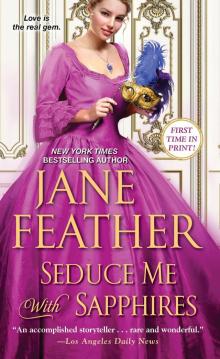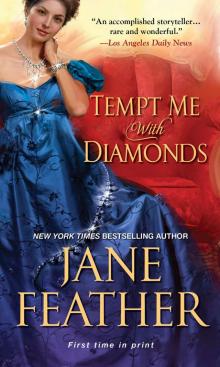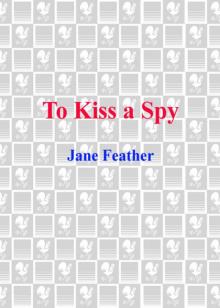Seduce Me with Sapphires, page 1





TRANSFIXED BY HIS GAZE
She found herself mute, a most unusual experience, as she watched him come closer. He stretched out a hand and cupped her chin, lifting it slightly. Then his lips lightly brushed hers and her skin tingled. When she made no move, he slid his other hand around her waist, drawing her close against him.
When his lips pressed against hers, warm, pliable and yet firm with a hint of demand, she gave herself up to the tactile whirl of feeling, her eyes closing her into a world of pure physical sensation. His body was hard against hers, his arm warm and strong around her waist, the taste and scent of him a heady mélange of woodsmoke from the fire and the sweetness of butter and honey with an underlay of lemon, fresh and sharp on his skin.
When finally his mouth left hers, her eyes opened, looking straight into the piercing blue intensity of his gaze. “I enjoyed that,” he said softly, brushing a loose strand of hair from her cheek.
She found her voice at last. “Yes,” she murmured. “I did too.”
“When can we do it again?” he said, a glint of humor in his eyes.
“Now?”
He drew her against him again, and this time the kiss was harder, fiercer, more demanding, and Fenella found herself responding with the same fierce demand, her body pressing against his as his hands moved down her back....
Also by Jane Feather
Tempt Me With Diamonds
Love’s Charade
Smuggler’s Lady
Beloved Enemy
Reckless Seduction
SEDUCE ME With SAPPHIRES
JANE FEATHER
ZEBRA BOOKS
KENSINGTON PUBLISHING CORP.
www.kensingtonbooks.com
All copyrighted material within is Attributor Protected.
Table of Contents
TRANSFIXED BY HIS GAZE
Also by
Title Page
Copyright Page
Chapter One
Chapter Two
Chapter Three
Chapter Four
Chapter Five
Chapter Six
Chapter Seven
Chapter Eight
Chapter Nine
Chapter Ten
Chapter Eleven
Chapter Twelve
Chapter Thirteen
Chapter Fourteen
Chapter Fifteen
Chapter Sixteen
Chapter Seventeen
Chapter Eighteen
Chapter Nineteen
Chapter Twenty
Chapter Twenty-One
Chapter Twenty-Two
Chapter Twenty-Three
Chapter Twenty-Four
Chapter Twenty-Five
Epilogue
Teaser chapter
ABOUT THE AUTHOR
ZEBRA BOOKS are published by
Kensington Publishing Corp.
119 West 40th Street
New York, NY 10018
Copyright © 2020 by Jane Feather
This book is a work of fiction. Names, characters, places, and incidents either are products of the author’s imagination or are used fictitiously. Any resemblance to actual events or locales, or persons living or dead, is entirely coincidental.
All rights reserved. No part of this book may be reproduced in any form or by any means without the prior written consent of the Publisher, excepting brief quotes used in reviews.
To the extent that the image or images on the cover of this book depict a person or persons, such person or persons are merely models, and are not intended to portray any character or characters featured in the book.
If you purchased this book without a cover you should be aware that this book is stolen property. It was reported as “unsold and destroyed” to the Publisher and neither the Author nor the Publisher has received any payment for this “stripped book.”
Zebra and the Z logo Reg. U.S. Pat. & TM Off.
ISBN: 978-1-4201-4362-1
ISBN-13: 978-1-4201-4363-8 (eBook)
ISBN-10: 1-4201-4363-8 (eBook)
Chapter One
The Honorable Fenella Grantley glanced quickly along the corridor before she tiptoed past her mother’s sitting room. Lady Grantley’s avid curiosity about her only child’s plans for the day was inconvenient at best. Fenella loved her mother dearly, but she found it difficult to turn aside the questions without appearing uncivil. And her mother was bound to want to know how her evening with George had gone. Lord George Headington was rapidly becoming a thorn in Fenella’s side, but her mother’s hopes in that direction were, if not openly expressed, obvious to the dullest intelligence.
She hurried down the horseshoe staircase and across the hall to the front door. To her relief, none of the servants were around and, most importantly, Collins, the butler, was nowhere to be seen. Collins had an uncanny ability to get information without appearing to ask for it, and Fenella was in no mood for questions from anyone.
She stepped out of the house onto a frigid Albemarle Street. It was not quite midmorning and the street, normally busy with hackney carriages and delivery carts, was unusually quiet. The winter had been vicious, and on freezing days like this one, the residential streets of Mayfair tended to be almost deserted.
She turned up the collar of her sable coat against a violent gust of icy wind and quickened her step, looking for a hackney, but she had reached Piccadilly before she saw one. The wide, shop-lined thoroughfare was busy with foot and carriage traffic and she waved down a hackney with little trouble.
“Gower Street,” Fenella told the cabbie as she climbed in, grateful to be out of the wind for a minute. Alone in the musty interior she felt her spirits lift. She always felt this heady sense of freedom once she was on her way to Bloomsbury. She reveled in the sense that no one knew where she was, not even her dearest friends and certainly not her mother. No one knew where she was going or how she would spend her morning. Apart from the time she spent with Diana and Petra, life seemed, these days, to have a monotony to it. There was no sense of expectation or the possibility of surprise. She knew she had no right to feel this way; she should be thankful for her life of privilege and comfort. But somehow it didn’t seem to be enough, and however often she chided herself for being ungrateful and spoiled, she couldn’t shake off the grayness of her mood. And whenever she thought of Lord George Headington, the grayness grew darker and thicker.
The carriage turned the corner from Bloomsbury Square onto Gower Street, and Fenella fumbled in her change purse for the fare, her spirits lifting anew as she opened the door and jumped to the pavement, reaching up to the cabbie with the coins. He took them with a nod before taking a swig from a hip flask, clearing his throat and spitting phlegm onto the far pavement. Even in the bitter cold, the air was thick with the foul-smelling smoke from the sea coal fires of the poor and the heavy smoke from the anthracite heating of the houses of the rich. A day spent on London streets produced labored breathing and phlegm-filled lungs.
But Fenella was unaware of the polluted air; in her present uplifted mood, it smelled crisp, redolent of freedom. Bloomsbury was a respectable if unfashionable part of London, and one that had become familiar ground in her weekly forays over the last year. She went up the steps of a narrow, terraced house halfway along Gower Street and let herself in through a front door badly in need of repainting. The narrow hallway was equally in need of redecorating, the skirting boards scuffed, the linoleum on the floor scratched and lifting at the edges. The air was chilly despite the rattling huff from a steam radiator and the gaslight showed only dimly through its dust-coated sconce on the dingy, gray wall.
A narrow staircase rose to the upper floor from which the sounds of scales on a piano drifted down. Fenella hurried up the stairs to the first-floor landing. The piano was louder, coming from behind one of the closed, badly painted doors along the corridor. The chill light of the February morning showed through a grimy window at the far end of the corridor. Fenella opened a door halfway along.
“Good morning, everyone,” she greeted the small group of people gathered around a long table in the large room. They were all huddled in coats, gloved fingers fumbling with sheaves of paper in front of them. Another steam radiator grumbled ineffectually from beneath a window, which looked out onto the street.
“Oh, good, you’re here at last,” commented an elderly man with a distinguished mane of silver hair sitting at the head of the table. His threadbare frock coat, fingerless gloves and stringy woolen muffler did nothing to diminish the power of his presence.
Fenella refrained from pointing out that she was actually five minutes early. “My apologies, Cedric, I didn’t realize I was keeping everyone waiting.” She offered a general smile, remarking, “It’s bitter out there,” as she took a spare seat at the table, drawing her coat closer around her.
“It’s bitter in here,” a young man muttered through his muffler. “If we’re to continue meeting like this through the winter, Cedric, we need a kerosene stove or something.”
Cedric Hardcastle, an irascible man at the best of times, ran his little drama school out of this run-down Bloomsbury house on a shoestring and glared at the speaker. “If you can pay for the fuel, Robert?”
Robert muttered something and chewed the tip of a pencil, staring down at the scratched tabletop. Fenella winced. She was the only member of this troupe who could afford to supply both stove and fuel, but she tried not to draw attention to her privileged world. They were all here for one reason: a passion for drama and a longing to tread the
Fenella picked up the sheaf of papers in front of her. It was an unfamiliar script; in general, their readings were from various forms of classical drama.
“We’re reading a new play today,” Cedric announced. “And we’re very fortunate to have the playwright with us to interpret any complexities in the script. Edward, do you have anything to say before we start?” He nodded toward the shadows at the far side of the room.
Fenella looked up from the papers, wondering why she hadn’t noticed the stranger sitting on the high stool when she’d first entered the room. When he stood up and stepped forward out of the shadows, she wondered even more at her initial failure to notice him. His physical presence was significant. He was a tall man with broad, powerful shoulders and square, competent hands. Fenella had always been drawn to a man’s hands. She liked them well-manicured and capable-looking. This Edward’s certainly fit that bill. She offered him a curious and friendly smile and was rather put off to encounter something akin to a scowl. The effect of the scowl was somewhat diminished by his eyes, which were of the most penetrating, startling blue Fenella had ever come across. Thick, unruly black eyebrows matched the equally untidy thatch of black hair flopping on his forehead and curling over his collar. It gave him a rakish air. It was a pity about the scowl, she thought.
She glanced down again at the script. “Edward Tremayne” was written boldly on the title page, and beneath it, Sapphire. The only Tremaynes she knew socially, Viscount Grayling and Lady Julia, were the children of the Earl of Pendleton, but this morose individual couldn’t possibly be associated with that family. He reminded her of an ill-tempered, scruffy mongrel, with his black, overlong hair much in need of a brush. Which, of course, was most uncharitable of her, and Fenella was not, in general, uncharitable.
“Sapphire?” she queried pleasantly. “Is that the title of the play?”
“It’s a working title,” Edward Tremayne declared with a dismissive flick of his hand. His voice was attractive, deep and well-modulated. “If you read the script, you might understand the point.”
Fenella felt her initial prickle of irritation blossom into an active dislike. She and Mr. Tremayne were not going to get along well if matters continued in this fashion. His arrogance was palpable. But perhaps he was nervous at the prospect of hearing his play read by strangers, or even perhaps for the first time ever. With an effort, she accepted the charitable explanation and swallowed her annoyance, removing her attention from him by deliberately turning her head away and asking Cedric, “Do we have specific parts for the reading, or are we going around the table?”
“You’re reading Rose,” Edward Tremayne declared. “I don’t mind who else reads what. Cedric, you decide.”
“Why am I to play this Rose character?” Fenella asked, genuinely puzzled at such a definite statement. “You don’t know me. You haven’t heard me read. How can you be so sure I’ll be right for it?”
“I can’t. Call it instinct,” he responded.
Fenella frowned, a strange feeling of déjà vu prickling the nape of her neck. There was something familiar about him, a sense that she’d caught an image of him in her peripheral vision at some point. A glancing familiarity. She stared at him as the memory crystallized. She had seen him before, she realized. Several times, in fact. She remembered one of the innumerable dances she’d attended during an occasion as boring and unproductive as most of them except that she’d been acutely aware of a man standing, arms folded, against the wall, glaring at the dancing couples. She’d been struck by the glare, which rather mirrored her own feelings hidden beneath the polite smile and cheerful inconsequential chatter.
She’d forgotten all about him once the dance was over, but now she remembered that once she’d thought he’d been outside her house, just hovering across the street when she’d come down the front steps. If he hadn’t been such a large and imposing figure, she probably wouldn’t have noticed him at all among the ambling pedestrians on Albemarle Street. And once, walking down Park Lane, she’d had the unmistakable sensation of being followed. She’d cast an involuntary glance over her shoulder just as a tall man disappeared into an alley. At the time, the glimpses had not struck her as strange. He was a member of the privileged society inhabiting the streets of Mayfair; it was hardly surprising she would catch sight of him now and then. Now the extraordinary thought struck her that perhaps these occasional appearances had been intentional.
Ridiculous idea. She was just being fanciful. What possible reason could he have had to follow her? Anyway, she was far too interested in the idea of the reading to continue pointless speculation. She shuffled the pages of the script and quickly saw that Rose appeared on almost every page. Well, she was always up for a challenge; this whole acting project had started as a challenge, one she kept very much to herself. Lord and Lady Grantley would have forty fits if they knew of it; it was hardly a suitable activity for a baron’s daughter. For some reason she hadn’t even confided in her oldest and closest friends. Fenella wondered if she was embarrassed or ashamed of this weird passion but decided that she was neither. It was just something very personal and private . . . a welcome distraction from the restless malaise that for some reason hovered over her these days.
However, it occurred to her now that it was definitely time to confide in Diana and Petra. The secret was getting too demanding to keep to herself. The whole business was taking up too much of her time to continue pretending to herself that it was just a hobby, of no more significance than Diana and her racehorse, or Petra and her passion for eccentric and colorful clothes and all things related to the music hall.
“Shall we begin?” Cedric said after allocating the remaining parts around the table.
Fenella, as usual, quickly lost herself in the drama of the reading. It was one of the things she loved so much about the activity, the way it took her out of herself. But she wasn’t sure about her character. She seemed more a cipher than a real person and it was hard to get a handle on how to play her. Once or twice she became aware of Edward Tremayne looming behind her, seeming even larger on his feet than he had on his stool. And he made her nervous, which annoyed her even more.
She stumbled over a line and heard an audible sigh of exasperation behind her. She slapped her hand on the papers in front of her and turned to look over her shoulder. “Could you possibly stand somewhere else, Mr. Tremayne? You’re putting me off.”
The blue eyes narrowed, and for a second, a pop of fire illuminated their sapphire depths. Edward offered a mock bow. “Forgive me, Miss Grantley. I have no intention of disturbing your delicate sensibilities. In my experience, amateur actors can’t afford to be too sensitive.”
“I am not in the least sensitive or delicate,” Fenella retorted, wondering what she could have done to arouse such hostility from a stranger. “But when all I can hear is your heavy breathing down the back of my neck, I find it impossible to concentrate.” Her gray eyes snapped at him.
He stepped back, raising his hands in a defensive posture. “The lady has a temper, I see. Where should I put myself, ma’am, so that I don’t disturb your concentration?”
“I couldn’t care less,” she stated. “Just don’t stand behind me.” Fenella was aware of the interested, amused eyes of her companions. This completely unnecessary spat was proving entertaining to everyone but herself.
“This Rose character has no stuffing to her,” she declared, now more than ready to do battle. “She’s just flat words on a page. There’s no fire, no emotion, no hint of complexity, nothing to work with.” She ordered the papers in a neat pile in front of her. “I have no interest in this reading, Cedric. I apologize to you all.” She stood up abruptly, for the moment not caring what bridges she was burning. Drawing on her gloves, she left the room, an astounded silence in her wake.
























